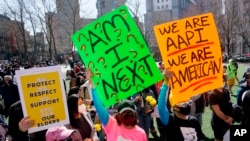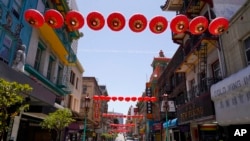There is diversity in the ways Asian American adults identify themselves, a new report found, with about half saying they most often describe themselves by the ethnic labels that reflect their heritage, and the other half saying they describe themselves as American.
The study, released Monday by the Pew Research Center, also found that 90% say Asians living in the United States have many different cultures. Among all adults in the United States, 80% say Asians in the country have many different cultures.
The study is part of Pew’s multihmmyear effort to better understand views and opinions of Asian Americans. The researchers polled 7,006 Asian adults between July 2022 and January of this year, making it the largest nationally representative survey of its kind to date.
“Doing this survey was really important because in the polling industry and public opinion industry in general, you see very little on Asian Americans,” said Neil Ruiz, head of New Research Initiatives at Pew.
There are about 24 million Asian Americans in the United States, comprising about 6% of the U.S. population, but public opinion polling historically gives the community very little attention, according to Ruiz. Pew wanted “to really understand the spectrum of Asian Americans views,” Ruiz told VOA.
Pew found that although there is significant diversity among Asian American communities, there is also a shared experience among all Asian Americans. There’s a sense of “a linked fate” among Asian Americans, Ruiz said.
Asian American adults report feeling connected with other Asian Americans, with about six-in-10 saying they feel connected to other Asians in the country. About two-thirds said it is extremely or very important to have a national leader advocating for the Asian populations in the United States, and about six-in-10 saying what happens to other Asians in the country affects their own lives.
Of the 24 million Asian Americans in the United States, about 17.8 million are adults. The six largest origin groups in the United States -- Chinese, Filipino, Indian, Korean, Vietnamese and Japanese -- account for 81% of all Asian American adults.
Pew found that 24% of Asian Americans say they are extremely or very informed about the history of Asians in the United States, compared to an equal share who say they are little or not at all informed.
Most of those who are very or extremely informed say they learned about this history through informal channels like the internet.
Most Asian American registered voters identified with the Democratic Party, according to the report.
The study found that 68% of Indian registered voters, 68% of Filipino registered voters, 67% of Korean registered voters, and 56% of Chinese registered voters associate themselves with the Democratic Party.
In contrast, a little over half of Vietnamese registered voters lean toward the Republican Party.
To avoid making over-generalizations about a large community whose members have widely varied experiences, Ruiz said Pew made sure the sample size was large enough. Still, research remains limited when it comes to less populous Asian origin groups in the country, Pew said.
To help address that shortcoming, the survey was complemented by 66 presurvey focus groups of Asian adults representing 18 Asian origin groups.
The Pew study follows a reported rise in anti-Asian hate crimes in the United States.
In March, the FBI released hate-crime statistics for 2021 that cited 746 attacks targeting people of Asian descent across the country, up from 249 the previous year and the most ever recorded in a single year.
The report “Righting Wrongs” was released last week by Stop AAPI Hate, a coalition co-founded by AAPI Equity Alliance, Chinese for Affirmative Action and the San Francisco State University Asian American Studies Department. The report found that during the rise of COVID-19-related anti-Asian racism, nearly half of people from Asian American and Pacific Islander communities faced discrimination or unfair treatment.
“Half of those who faced discrimination reported negative effects on their mental health, 45% said discrimination changed their sense of belonging and roughly a quarter said their experience strained close relationships,” according to the report. “Yet only one in five reported the violation and a majority of those who reported said the process was difficult,” according to the report.
It was based on a survey of 1,331 people was conducted by the 82-year-old NORC nonpartisan research institution at the University of Chicago from November 30, 2022 - December 22, 2022.
Meanwhile, the Pew study found that one-in-five Asian Americans adults say they have hidden part of their heritage from non-Asians, sometimes out of fear of embarrassment or discrimination.
Asian adults between the ages of 18 and 29 were more likely to have hidden part of their heritage than Asians over the age of 65. Those born in the United States are also more likely to have done so than immigrants.
Since Asian Americans are often ignored in polling and public opinion surveys, Ruiz said he hopes it will be meaningful for Asian Americans to see themselves represented in such an extensive study.
“It’s also about educating the general public, policymakers, schools, educators, philanthropists -- they will be able to use this data to really understand what are the needs of the Asian American population,” Ruiz added.






